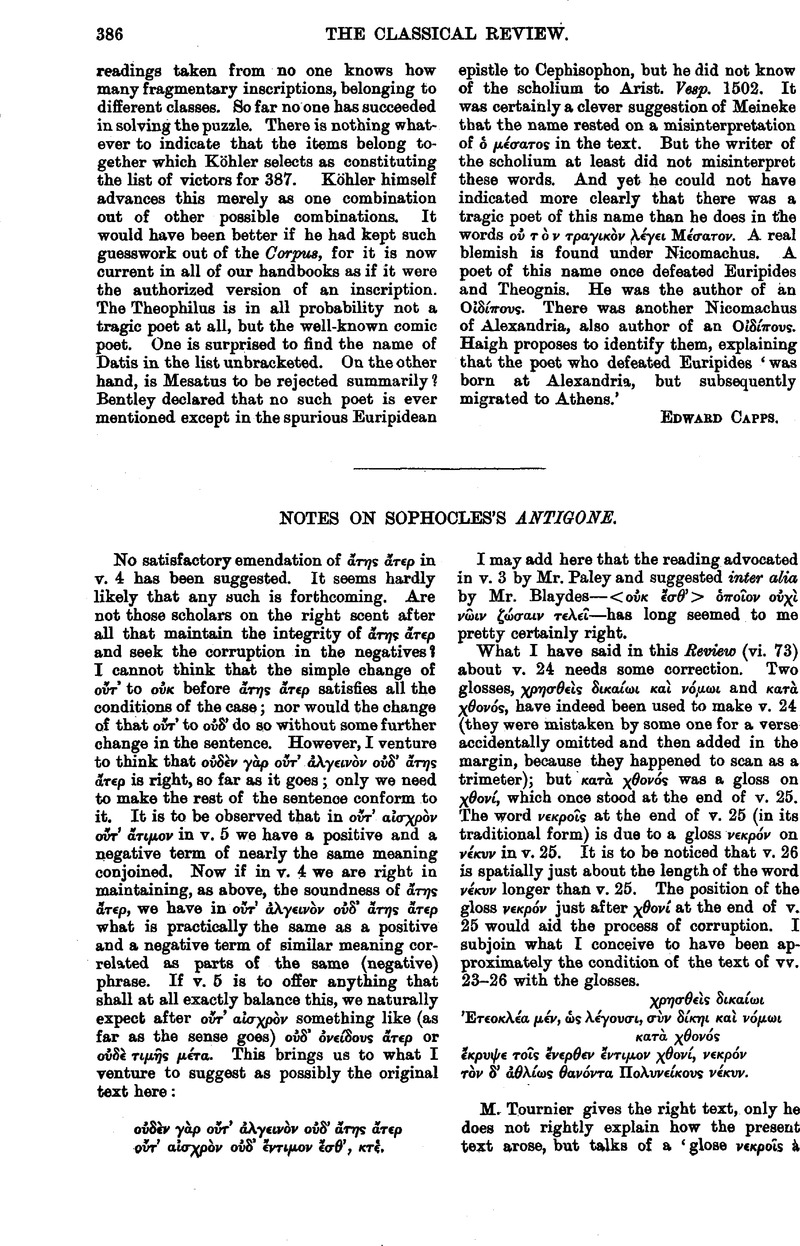No CrossRef data available.
Article contents
Notes on Sophocles's Antigone
Published online by Cambridge University Press: 27 October 2009
Abstract

- Type
- Original Contributions
- Information
- Copyright
- Copyright © The Classical Association 1899
References
page 388 note 1 Why, we are not told. Is there here a trace of the tale of the Lost Paradise? and have the Διφυλακα (321 D) anything to do with Genesis 3, 24?
page 389 note 1 We find here, as Professor Blass remarks, in Protagoras's tale a very clumsy attempt at connecting primitive art and primitive worship.
page 389 note 2 If we seek to see chronological development earlier in this passage, we shall find man ploughing with the ἵππειον γνος before he has tamed the ἵππος.
page 389 note 3 What Sophocles wrote where παρερων stands may not be absolutely certain, bat I believe that Professor Jebb is right in thinking that Reiske's γαραρων is it. The word ![]() in the scholion to v. 368 cannot well be a corruption of παρερων. But παρερων in the text might come from γερρων, or from
in the scholion to v. 368 cannot well be a corruption of παρερων. But παρερων in the text might come from γερρων, or from ![]() unclearly written as a gloss on γεραρων. At all events the righteous man is intended to be described as
unclearly written as a gloss on γεραρων. At all events the righteous man is intended to be described as ![]() . Professor Blass seems to have misunderstood
. Professor Blass seems to have misunderstood ![]() . (With παρερων, for γεραρων, cf. παρντα for γροντα O.T. 971.)
. (With παρερων, for γεραρων, cf. παρντα for γροντα O.T. 971.)
page 389 note 4 The ![]() as Protagoras relates it has, as Professor Blass notes, no strict logical sequence. In this Plato may have wished to parody his sophist's naïveté. Whether this be so or not, the story is certainly naïve. If an ‘Orphic’ poem underlies the
as Protagoras relates it has, as Professor Blass notes, no strict logical sequence. In this Plato may have wished to parody his sophist's naïveté. Whether this be so or not, the story is certainly naïve. If an ‘Orphic’ poem underlies the ![]() , it in turn will have been based on a primitive legend.
, it in turn will have been based on a primitive legend.
page 389 note 5 By reading ![]() .
.
page 389 note 6 Gr. Gramm. 496, 8 ad fin. (‘Media statt der Passiva’), ‘Soph. Ant. 354 κα), φθγμα—διδξατο, wo. nach dem gowöhnlichen Sprachgebranch διδχθη stehen sollte. Aber διδχθη heisst, er lernte von andern passive, διδξατο, er lernte durch eigne Thätigkeit’.
page 390 note 1 The following note was read before the American Philological Association at Trinity College, Hartford, Conn., 6 July, 1898.
page 391 note 1 It is worth while more fully to compare the passage in the Memorabilia cited by Erfurdt. It is as follows: ‘ ![]() in v. 193 (which is the reading of L) is dne to τνδ’ immediately above it in v. 192.
in v. 193 (which is the reading of L) is dne to τνδ’ immediately above it in v. 192.


